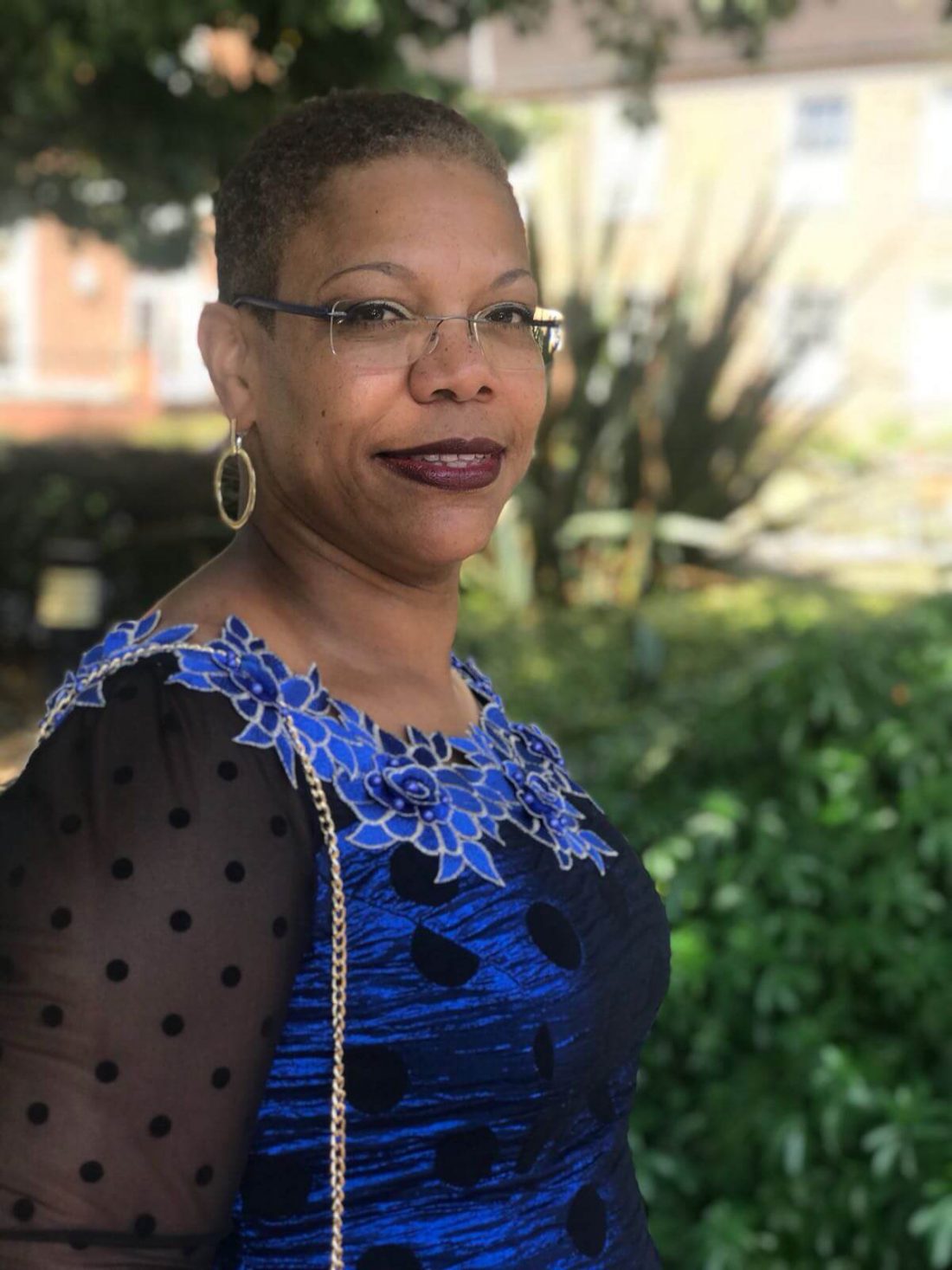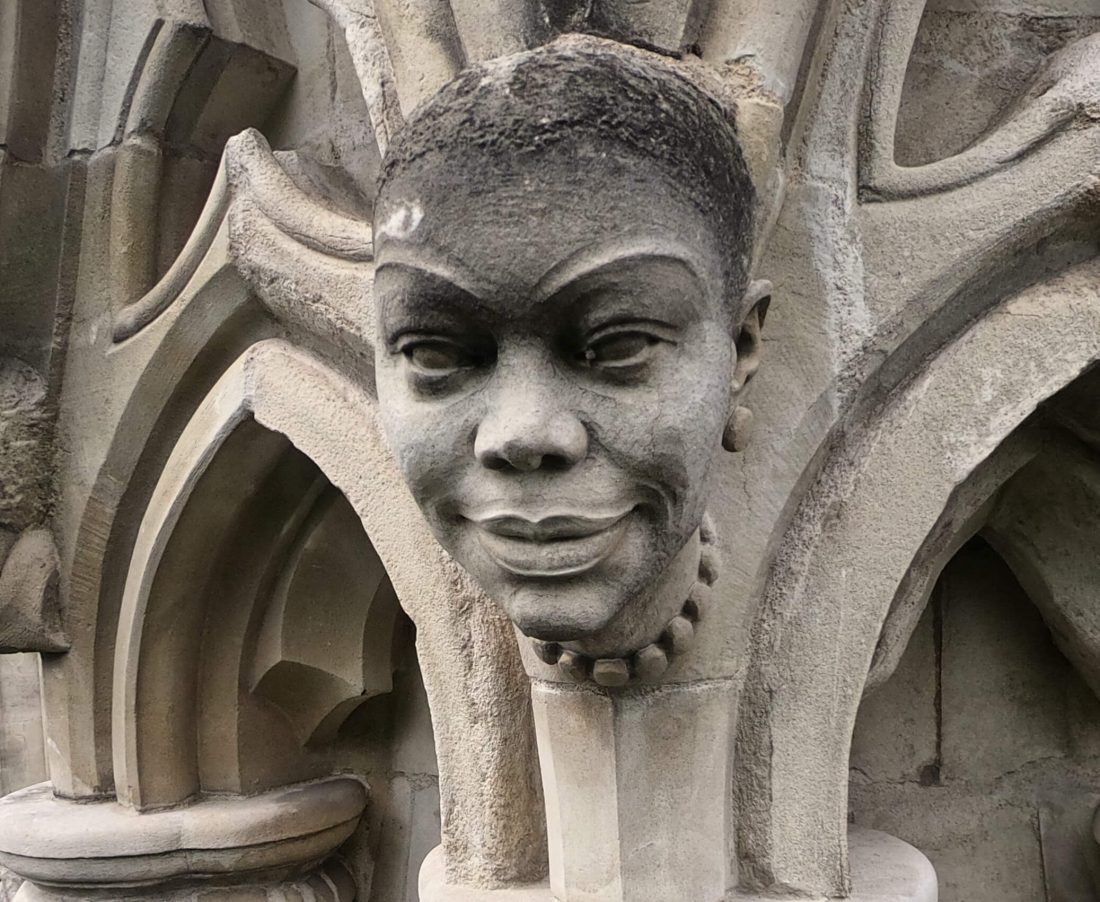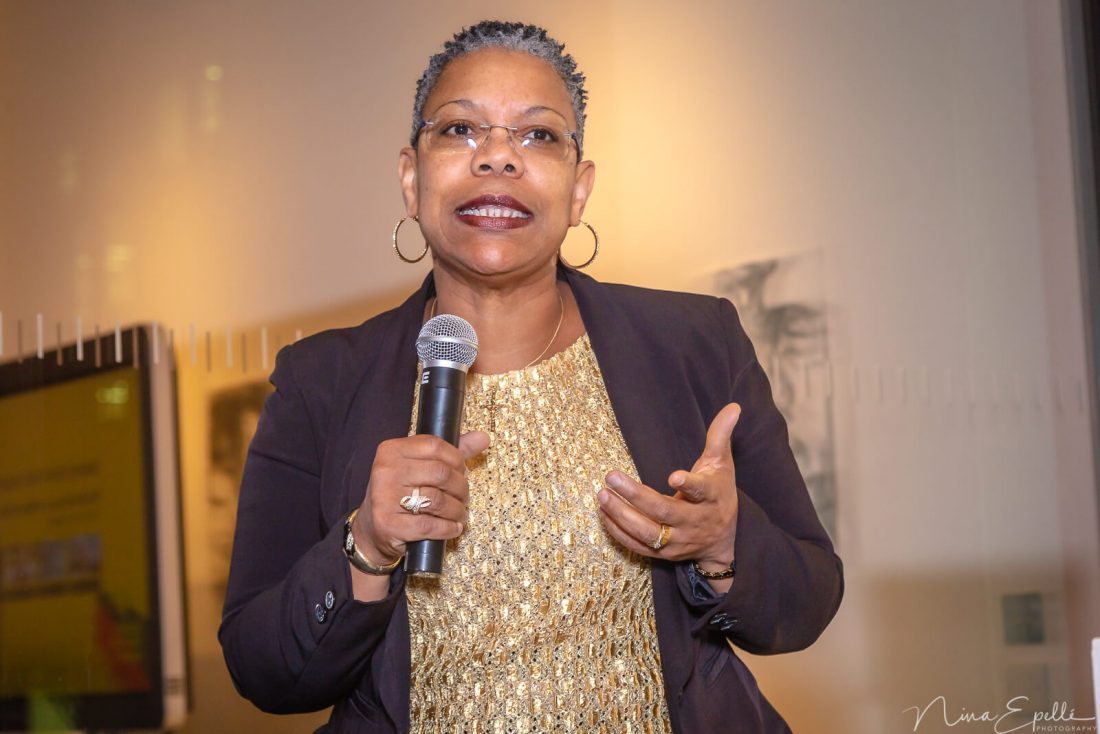Without a doubt, Mary Pierre-Harvey is a woman who has created her own path unapologetically. A Chartered Quantity Surveyor with a master’s degree in architecture and a career of many firsts, Mary talks to Melan about her life as a pioneer, mentor and all-round woman of courage.

Born in Port of Spain, Trinidad, Mary moved to England in the early 80s where she has created an extensive and impressive 35-year career in the construction and property industry, while working for a variety of prestigious and high-profile world-leading organisations.
Mary has held senior positions within organisations like English Heritage, Harrow School and Oxford Brookes University. In fact, with a bird’s eye view, Mary’s face is carved and installed on the roof of Westminster Abbey (pictured below), a unique claim that few people can boast of.
In our exclusive interview, Mary shares with us what it takes to work in prominent senior leadership roles, mentoring others and using her Trinidadian values in all aspects of her life.
Tell us about your working career and journey
My secondary school friends wanted to be accountants, lawyers and pharmacists, but I wanted to be something different. I decided to go into the construction and property industry because it was predominantly a white male-dominated industry with very little (if any) Black females like me. I studied Quantity Surveying at Greenwich University but after a year of practice I was so bored that I enrolled on a Master of Science degree course at University College London studying Architecture and Project Management.
I spent five years in the private sector where I achieved my professional membership of the Royal Institution of Chartered Surveyors. I was then head-hunted because of my commercial acumen and excellent customer service to work with a housing association as the Head of Buildings. The job: to lead what was then the largest social housing development project in Europe – the development of Blackbird Leys in Oxford.

My thirties saw various opportunities including a relocation to London with my family where I took on roles at the London Borough of Richmond upon Thames, English Heritage as Head of Estates which saw me being responsible for an amazing portfolio of historic properties that included Dover Castle, Westminster Abbey’s Chapter House, and Osborne House. I eventually landed the role of Director of Estates at Harrow School where I was the first Black person to hold such a position.
I worked ridiculous hours during the week and weekends, and I wasn’t really mentally present at home and completely missed signs of depression in one of my children that needed urgent attention. I took a career break to care for my child to see them through some major exams. Despite my experience and qualifications, I could not believe how difficult it was to get back into paid employment after a year’s career break.
I finally accepted the role of Assistant Director, Strategic Estates at the Palace of Westminster, where I was the most senior Black woman in the organisation’s professional services.
My most recent challenge saw me take on the Director of Estates and Campus Services role at Oxford Brookes University, where once again I became the first Black woman to hold such a senior position.
How does it feel to always be the first in so many of your roles?
I’ve always liked challenges. I felt it was important to pave the way for others given that there are so few of us in this sector in senior positions. As others had paved the way for me, so I needed to pave the way for others.
I was just tired of the ‘glass ceiling.’ It felt like a weight on my career head, year in, year out and I wanted to break through it.
I did not want to settle for what others expected me to be so the stereotypical views of Black women or the positions we are expected to hold are confined to some particular spaces. I thought, ‘no, some of us are capable of more so I would achieve my potential and not settle for what others thought I should be.’
I also wanted to be a role model for my children, because as a working mother with five amazing children – four of whom have graduated from university and in gainful employment, I felt it was important to set some success standards for them that they could follow if they chose to.
Another of my motivations was my dear mother who never achieved her career aspirations because she had no one to encourage, help and support her. I wanted therefore, to achieve the dreams that she never did. I am thankful that I have been able to achieve those and make her proud.
“I’ve always liked challenges. I felt it was important to pave the way for others given that there are so few of us in this sector in senior positions.”
What are you proud of, career-wise?
Empowering and promoting talented staff is one of my achievements. I once managed a Grounds Manager who was a great manager and I asked: ‘have you ever looked into moving in to senior management’ and he said ‘no.’ So, I coached and mentored him. During my time at the organisation, he progressed from a Grounds Manager to a Head of Estates. He didn’t even realise he could do it. When others doubted that he could do it, I believed in him and supported him. I think it’s so beautiful to spend time helping people to progress into spaces where they felt they couldn’t go or did not belong.
On the home side the achievement I’m really proud of so far relates to my son. Despite having ADHD (Attention Deficit Hyperactivity Disorder) and being expelled from primary school and initially refused entry to the secondary school of his choice, he graduated from the University of Cambridge this year. Fighting for your child irrespective of the personal cost and seeing the fruit of that is simply marvellous.
Do you think race relations in the UK has improved?
I think we have made some progress but not enough to change the tide.
Some employers are recruiting Black women as tokens to show they are doing something, but some are being set up to fail or face the glass cliff. There may be increases in recruitment but I’m not sure how that corresponds to the numbers retained, empowered, promoted, and given their rightful place at the organisation’s decision-making table.
At times I have felt that recruiters do it to tick a box for themselves to be seen to be ‘committed’ to race equality but once that has been achieved – they may choose to get you out. I am a contributor to Building magazine and my recent comment entitled: ‘If Black lives really matter, then do something now’ has been very well received and described by many as honest, easy to read and practical. Every organisation should be able to carry out all or some of the recommendations I made.
“Some employers are recruiting Black women as tokens to show they are doing something, but some are being set up to fail or face the glass cliff.”
Describe a typical day in your life
A typical day does not exist in my life. If my children were to describe it from their point of view, they might say that I get up very early in the morning to pray. I am an early riser – sometimes starting as early as 3:30am. I would sometimes do a bit of cooking or cleaning before leaving the house for work. During the day I go non-stop with meetings and activities – seldom with a proper lunch break. I would stop at some point to have something to eat then I would be off again. There are things to do and I need to fit them all in, so my day is full of my children, work, church, or shopping. I am usually asleep before 10pm. On weekends, I spend hours cooking traditional West Indian food, leading my music ministry, and going to church.

Image credit: Nina Epelle Photography
What words of wisdom have guided you?
My words of wisdom have come from my mother. She always reminded me to treat others as I would like to be treated and I don’t think I quite understood what that really meant until my adult life. She taught me from very young to be very respectful to orphans, the disabled and elderly. My mum was an orphan.
As a single mum on her day off she would sometimes take me and my siblings to orphanages and homes for disabled children or adults to teach us to be respectful and compassionate towards those who were less fortunate than we were. She wanted us to learn that we shouldn’t sneer at them, but they ought to be reached out to, loved, and not treated any differently – in fact, they should be treated equally.
My mother was a nursing assistant, and she could spot that someone needed help from miles away and she would go and help. She led by example showing us what it is like to care because we always saw her doing kind acts. I have followed that path to always keep an eye out for someone else in need. Give and help even when you do not have much, give of the little that you have. And those things are all very important to me and it shaped who I am today.
“My advice for Black women looking to move into senior leadership begins with saying that everyone is a leader – you might not be aware that you are.”
Who would play you in the story of your life?
I would have to choose Oprah. I have been watching her in the drama Greenleaf (which is about a Memphis megachurch run by a Black family) and she is simply an awesome actor. She is such a talented woman and quite down-to-earth – like I am. Everything she does is brilliant, so she gets my vote to play me in the film and no audition needed! I’d even let her improvise!
What three people would you invite to a fantasy dinner party, past and present?
Nelson Mandela would be my guest so he can say the opening prayer before the meal and remind us of the importance of forgiving others all the time.
My husband would be on the guest list because he is such a measured and smart human being that he would keep me in check.
My mum would also be invited. She is now 89 with dementia but I would want her there because she has been so uncelebrated in her life so I would do anything I could to elevate her and put her on a pedestal that I think she deserves but she’s never had the privilege or prosperity. She did not finish school, was a domestic servant then went on to be a nursing assistant – she is my biggest inspiration and heroine. I would not be where I am today without the sacrifice of her life that she made for me.
What advice would you pass to other women trying to make it in their industry?
My advice for Black women looking to move into senior leadership begins with saying that everyone is a leader – you might not be aware that you are. But I think if everyone examines their life, they will find some aspect of leadership that is hidden or uncovered.
Mary’s advice to Black women:
- Recognize that your work life should account for about 25% of your life. If it’s more than this you might be heading for burnout and you might be missing out on nature, hobbies, homelife and friends. So many of us overcommit to work and don’t realise it until it is too late.
- No man or woman is an island – surround yourself with allies, a sponsor within your organisation, a mentor, a coach, a buddy, a life friend to support you and journey with you.
- Maintain a portfolio of your achievements – when we were young, we had certificates, pictures, and mementoes. But when we become adults, we sometimes forget to record our achievements. Record all the things you achieve and are proud of and at times when you lack confidence or motivation, or when you’re applying for a new job, the portfolio of your achievements would be handy.
Final word?
My name may never be written in the pages of history but as long as it’s written on the hearts of those I inspired, empowered, helped and supported – I am content with that because if I can help somebody as I pass along, then my living shall not be in vain.












